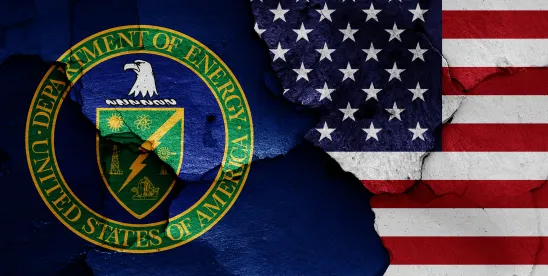A multistate coalition of twelve state Attorneys General—California, Connecticut, Illinois, Maine, Maryland, Massachusetts, Michigan, Minnesota, New Jersey, New York, Oregon, Vermont, and Washington—joined by the District of Columbia and the City of New York (Multistate Commenters), filed comments on July 15, 2025, opposing the U.S. Department of Energy’s (DOE) proposed rules to weaken or rescind energy and water‑efficiency standards for 16 categories of consumer and commercial appliances.
In addition to the Multistate Commenters, some trade associations representing appliance manufacturers have also raised concerns regarding DOE’s proposed rules, including that federal deregulation would open the door to a patchwork of state requirements and may allow the import of cheaper, less efficient products into the United States.
What DOE Is Proposing
Following the Trump administration’s directive to “slash unnecessary red tape and regulations,” on May 16, 2025, DOE proposed dozens of deregulatory proposals that would strip or weaken energy‑ and water‑efficiency requirements across a wide range of appliance and equipment categories. These deregulatory proposals include appliances such as external power supplies, clothes washers, compressors, and portable air conditioners. For more information on the impacted product categories, see our previous news alert here. In some instances, DOE proposed rescinding standards that prior administrations had adopted through rulemakings and reverting to less stringent statutory standards. In other instances, DOE proposed to eliminate standards or to withdraw a prior covered products determination (which would have the effect of rescinding applicable standards).
What the Multistate Commenters Are Arguing
The Multistate Commenters make several arguments in their comments on the proposed rules, primary arguments include:
- The Energy Policy and Conservation Act (EPCA) explicitly bars the weakening or removal of standards without a new, statutorily authorized rulemaking —yet the proposals would undo standards already in force.
- DOE fails to provide the “reasoned explanation” for its proposed action required by the Administrative Procedure Act, reversing course without updated technical or economic analyses.
- DOE does not quantify the substantial lifetime utility‑bill savings that justified the existing standards, as EPCA mandates, nor does the agency show that the existing standards were not “economically justified.”
- DOE’s proposals are noncompliant with ancillary statutes and executive orders, including the absence of environmental review under NEPA, failure to assess impacts on small businesses under the Regulatory Flexibility Act, and omission of a Statement of Energy Effects under E.O. 13211.
- By rescinding long‑relied‑upon standards, DOE’s proposal threatens to flood the U.S. market with cheap, lower‑efficiency imports that undercut domestic producers, reverse decades of energy‑savings progress, and strain the electric grid.
A Prelude to Litigation
Filing detailed comments is a well‑worn first step before seeking judicial relief to enjoin agency action. Consumer and environmental groups have already challenged narrower rollbacks; with states now in opposition, lawsuits seeking to enjoin DOE’s actions appear likely. Less clear is whether any manufacturers, trade associations, utilities (who generally favor appliance efficiency initiatives), or other industry groups will join or bring their own challenges.
Some regulated businesses or their trade associations may also move to defend certain of DOE’s regulatory rollbacks, particularly where DOE is targeting recently adopted standards or test procedures, and businesses have yet to incur the bulk of the compliance costs.
DOE’s rulemakings preview some of the arguments the Department is likely to make if it must defend its deregulatory proposals in court, including that (1) the anti-backsliding prohibition only prevents backsliding from statutory, not regulatory standards, (2) the Department is not required to justify its determination to withdraw a covered products determination and (3) withdrawing a covered products determination does not run afoul of the anti-backsliding prohibition.
Increasing Regulatory Uncertainty for Regulated Manufacturers and Importers
Manufacturers expend considerable resources developing and designing products to ensure compliance with DOE energy and water conservation standards. DOE typically provides up to five years between the time it adopts a standard and it enters into force, recognizing that manufacturers require significant lead time to ensure compliance. The sudden rescission of numerous standards and test procedures, particularly if it is the subject of protracted litigation, is therefore likely to cause considerable regulatory uncertainty for companies that manufacture or import covered products.
This uncertainty compounds with the prospect that states will respond to federal deregulation by adopting their own standards. Indeed, many of the Multistate Commenters have their own growing appliance efficiency standards programs, with California’s being the most well-developed and rigorously enforced. During the first Trump administration, several states responded to federal efforts to delay or withdraw federal standards (e.g. general service lamp standards) by adopting their own standards for those same products. If DOE succeeds in rescinding numerous federal standards, states will likely act promptly to fill in any regulatory gaps. As has proven to be the case already for product categories such as showerheads (which states are allowed to regulate even though there is a federal standard), resulting patchworks of state regulations create their own compliance challenges for manufacturers, who may be able to market some products in all 50 states and others only in a subset of states that lack state standards. In the last seven months alone, the California Energy Commission has assessed penalties of hundreds of thousands of dollars for alleged non-compliance with state appliance efficiency standards.






 />i
/>i
